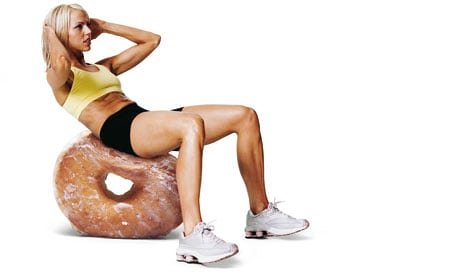Why exercise won't make you thin
The following correction was printed in the Observer's For the record column, Sunday 26 September 2010 Dr Timothy Church is at the Pennington Biomedical Research Centre of Louisiana State University, which is not affiliated to the University of Louisiana My mum used to complain that she couldn't lose weight. A size 18 and a couple of stone heavier than ideal, she tried in vain for years to shed the extra. Every week she headed to the gym, where she pounded the treadmill like a paratrooper, often three times a week. Most days she took the dog for a brisk, hour-long walk. She didn't eat unhealthily – the rest of the family ate exactly the same meals, and did a fraction of the exercise she did. She ought to have been the slimmest of the bunch: that she remained overweight was a frustration to her, and a mystery to all of us. From StairMasters to kettlebells, Rosemary Conley to Natalie Cassidy, we understand and expect that getting in shape is going to require serious effort on our part – and the reverse is true, too, that we expect exercise to pay back the hours of boring, sweaty graft with a leaner, lighter body. Since the days of the Green Goddess, we've known that the healthiest way to lose weight is through exercise. It's science, isn't it? Well, science has some bad news for you. More and more research in both the UK and the US is emerging to show that exercise has a negligible impact on weight loss. That tri-weekly commitment to aerobics class? Almost worthless, as far as fitting into your bikini is concerned. The Mayo Clinic, a not-for-profit medical research establishment in the US, reports that, in general, studies "have demonstrated no or modest weight loss with exercise alone" and that "an exercise regimen… is unlikely to result in short-term weight loss beyond what is achieved with dietary change." It sounds faintly heretical, if not downright facetious. And it's a scientific discovery that most health professionals are, naturally, keen to downplay. After all, exercise is still good for us. It's just that, in defiance of decades of New Year resolutions, it's unlikely to make us slim. Most of us have a grasp of the rudiments of weight gain and loss: you put energy (calories) into your body through food, you expend them through movement, and any that don't get burned off are stored in your body as fat. Unfortunately, the maths isn't in our favour. "In theory, of course, it's possible that you can burn more calories than you eat," says Dr Susan Jebb, head of nutrition and health research at the Medical Research Council, and one of the government's go-to academics for advice on nutrition. "But you have to do an awful lot more exercise than most people realise. To burn off an extra 500 calories is typically an extra two hours of cycling. And that's about two doughnuts."
Guardian Morning Briefing - sign up and start the day one step ahead
Read more From a practical perspective, then, exercise is never going to be an effective way of slimming, unless you have the training schedule – and the willpower – of an Olympic athlete. "It's simple maths," says Professor Paul Gately, of the Carnegie Weight Management institution in Leeds. "If you want to lose a pound of body fat, then that requires you to run from Leeds to Nottingham, but if you want to do it through diet, you just have to skip a meal for seven days." Both Jebb and Gately are keen to stress that there is plenty of evidence that exercise can add value to a diet: "It certainly does maximise the amount you lose as fat rather than tissue," Jebb points out. But Gately sums it up: "Most people, offered the choice, are going to go for the diet, because it's easier to achieve." There's another, more insidious, problem with pinning all your hopes for a holiday bod on exercise. In what has become a defining experiment at the University of Louisiana, led by Dr Timothy Church, hundreds of overweight women were put on exercise regimes for a six-month period. Some worked out for 72 minutes each week, some for 136 minutes, and some for 194. A fourth group kept to their normal daily routine with no additional exercise. Against all the laws of natural justice, at the end of the study, there was no significant difference in weight loss between those who had exercised – some of them for several days a week – and those who hadn't. (Church doesn't record whether he told the women who he'd had training for three and half hours a week, or whether he was wearing protective clothing when he did.) Some of the women even gained weigh

I agree. Exercise is important but intermittent fasting works the best for me to lose weight, plus lots of drinking water only